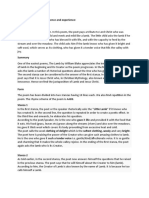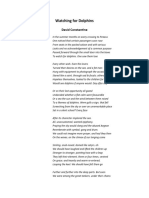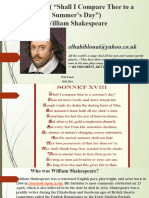The Border Builder - Notes
The Border Builder - Notes
Uploaded by
Peter PhanCopyright:
Available Formats
The Border Builder - Notes
The Border Builder - Notes
Uploaded by
Peter PhanOriginal Description:
Copyright
Available Formats
Share this document
Did you find this document useful?
Is this content inappropriate?
Copyright:
Available Formats
The Border Builder - Notes
The Border Builder - Notes
Uploaded by
Peter PhanCopyright:
Available Formats
The Border Builder:
Carol Rumens
Overview:
- Rumens explore the frustrations and hypocrisy of racism and xenophobia within his
poem through a trip through an immigration office.
- In the poem, a zealous immigration officer demands his customers to take a side in a
perceived good vs. evil fight and be defined by their blood, colour and nationality rather
than who they are.
Context:
- Rumens is a British poet who has won numerous awards over the last 40 years; her
poetry often tackles key issues that have arisen in modern European history.
- The poem was published in an anthology called “Best China Sky” in 1995, a few years
after the fall of Berlin Wall. It is noted that the collection was written while Rumens
was in Northern Ireland in the year before the ceasefire.
Content:
- Rumens begins by speaking of one wall coming down and then another going up. This
may refer to the Berlin Wall being torn down by David Hasselhoff in 1898. The new
wall going up may refer to the changing in focus of foreign policy at the beginning of
the 21st century where Muslims became the new face of fear thanks to the attack on the
Trade Towers and the wars in Afghanistan and Iraq.
- Rumens then touches on the idea that we are all judged on the basis of our background;
she, thereby, presents the common notion of xenophobia that a country needs barriers
to protect its bold and heritage, despite in reality, we are mongrels due history of
invasion and migration.
- Rumen places us in an immigration office of an officer who is blunt and merely seeks
to judge the customers by putting them into appropriate box so they can be judged. He
presents the traveller with the choice: are you with us or against use? As if the traveller
has no independence from his blood or nationality, and is in fact not an individual.
Language and techniques:
- “No sooner had one come down”/ “than he began building again”: “no sooner … than”
suggests the act of building borders and creating divisions has become part of a cycle
and has been programmed into us; “borders” here may not refer to actual physical
borders, but borders in terms of attitudes and categorizing people that are different than
us. Alternatively, the two lines may indicate the lasting effect of borders: even if the
physical border has been brought down, its presence will still remained. “He” may be
intentionally used to call out the many leaders of the period, who are men, for their act
of building borders.
- “My bricks… of my genuine blood!”: suggests the border may not be built of bricks,
but rather of judgment against people with different blood. The barrier that many
immigrants face are actually their skin, ethnicity, and religion. Alternatively, blood
connotes injury, therefore war; Rumens may be referring to the fact that it is through
wars that borders are defined and being built.
- “What would we be without border?” the rhetorical question asks us to think of a world
where there are no divisions and no different races and cultures. Alternatively, Rumens
may be raising a concession point that without border we loses our nationality and sense
of identity, something many are proud to have.
- “So which one are you?”/ “Which side are you on?”: these rhetorical questions then
force us to choose and to define ourselves on the basis of these unalterable differences.
It underlines the idea that we are defined by our ethnicity, something we can change,
thus, we aren’t treated as individuals.
- “Struck out his hand” and “slammed”: indicates how through preconception or on the
basis of just the colour of one skin, one could exert a sharp and arbitrary attitude towards
another individual. Alternatively, “struck out” could actually convey warmth and
welcoming as someone “struck” their hand out to greet someone; Rumens may be
making the point that before we making assumptions based on one’s skin and if we are
not prejudiced, we could all be nice to each other.
- “merrily he unrolled”: indicates that the immigration officer takes joy in doing his job
as by asking these questions he hope to be able to reaffirm his biased opinion and
justified his own building of his own barriers.
- “walls ears and eyes”: refers to the media and the government who have created these
artificial borders, hatred and fears. Furthermore, the line could be suggesting that the
government, through its surveillance over its population, manipulate its people to hold
certain views, to build artificial borders, in order to further its own powers. Contextual-
wise, it could refer to the Berlin War and the West surveillance of the East.
Alternatively, the line could be suggesting that the borders and barriers are built on
suspicion and assumption based on something we vaguely hear and see; thus, these
borders and barriers can be brought down if we actually interact with people different
from us.
- “which side is your bloody hand on”: the mini expletive indicates the anger and
simmering tension that separates the immigration officer and his traveller.
Alternatively, this hand could present the violence that the divisions cause and this
could be asking the immigrant to take sides in a war of cultures or believes – to get his
hands bloody. “O my genuine hand!” conveying physical injury and pain further
supports the idea that divisions can lead to bloodshed and war.
Structure:
- Single stanza composed in free verse: mirrors the utopia of a world without border and
division as advocated by Rumens.
- Repetition of “which one” “which side”: reflects on society and its controlling
influences that try to condition us to view the world as a case of us vs them and good
vs evil rather than the starting point of humanity amongst everyone on earth.
- Repetition of “O”: illustrates the frustration the attitude and division cause.
You might also like
- Pratt, K - Charlotte Smiths Melancholia On Page & Stage, (2001) 41 Studies Eng Lit 563 PDFNo ratings yetPratt, K - Charlotte Smiths Melancholia On Page & Stage, (2001) 41 Studies Eng Lit 563 PDF19 pages
- Myth and Realism in The Play A Long Day's Journey Into Night of Eugene O'neillNo ratings yetMyth and Realism in The Play A Long Day's Journey Into Night of Eugene O'neill4 pages
- A. C. Bradley As A Critic of Shakespearean Tragedy PDFNo ratings yetA. C. Bradley As A Critic of Shakespearean Tragedy PDF162 pages
- The Hour Is Come Poem Summary and Analysis LitCharts 2No ratings yetThe Hour Is Come Poem Summary and Analysis LitCharts 21 page
- Critical Appreciation of The Poem After BlenheimNo ratings yetCritical Appreciation of The Poem After Blenheim7 pages
- Plastic Theatre and Selective Realism of Tennessee Williams in The Streetcar Named DesireNo ratings yetPlastic Theatre and Selective Realism of Tennessee Williams in The Streetcar Named Desire2 pages
- How Does Shakespeare Present Tybalt and Mercutio and How Does He Influence100% (3)How Does Shakespeare Present Tybalt and Mercutio and How Does He Influence4 pages
- Comparison of Poems The Lamb and The TygerNo ratings yetComparison of Poems The Lamb and The Tyger2 pages
- Sonnet 18 ("Shall I Compare Thee To A Summer's Day") William ShakespeareNo ratings yetSonnet 18 ("Shall I Compare Thee To A Summer's Day") William Shakespeare30 pages
- A Resource Guide For High School Teachers: Dr. Maya AngelouNo ratings yetA Resource Guide For High School Teachers: Dr. Maya Angelou21 pages
- The Theme of Wuthering Heights ReconsideredNo ratings yetThe Theme of Wuthering Heights Reconsidered4 pages
- Gale Researcher Guide for: William Blake's Songs of Innocence and of ExperienceFrom EverandGale Researcher Guide for: William Blake's Songs of Innocence and of ExperienceNo ratings yet
- Canterville Ghost Past Simple and ContiniousNo ratings yetCanterville Ghost Past Simple and Continious3 pages
- Writing Articles For Scientific JournalsNo ratings yetWriting Articles For Scientific Journals12 pages
- Mutch, Deborah (Ed) - The Modern Vampire and Human Identity (2013)No ratings yetMutch, Deborah (Ed) - The Modern Vampire and Human Identity (2013)233 pages
- A Formalist Criticism Approach On Jose Garcia Villa100% (1)A Formalist Criticism Approach On Jose Garcia Villa2 pages
- List of Mesopotamian Deities - Wikipedia, The Free EncyclopediaNo ratings yetList of Mesopotamian Deities - Wikipedia, The Free Encyclopedia5 pages
- S.Y.B.a. English Literature Paper - II - Indian Literature (Rev)50% (2)S.Y.B.a. English Literature Paper - II - Indian Literature (Rev)199 pages
- Advances in Corpus Applications in Literary and Translation StudiesNo ratings yetAdvances in Corpus Applications in Literary and Translation Studies321 pages
- Vertical Grammar of Parallelism in Biblical Hebrew (David Toshio Tsumura) (Z-Library)100% (1)Vertical Grammar of Parallelism in Biblical Hebrew (David Toshio Tsumura) (Z-Library)157 pages

























































































